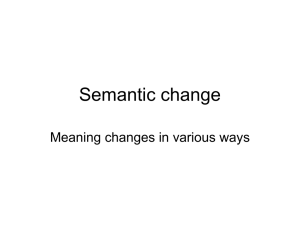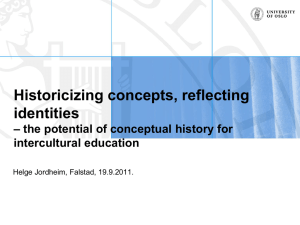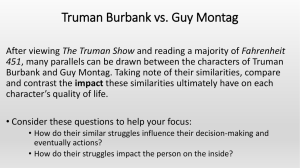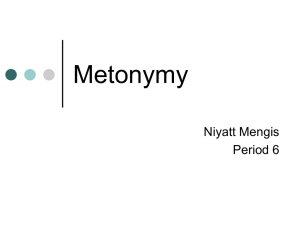Ofra Magidor: slides
advertisement
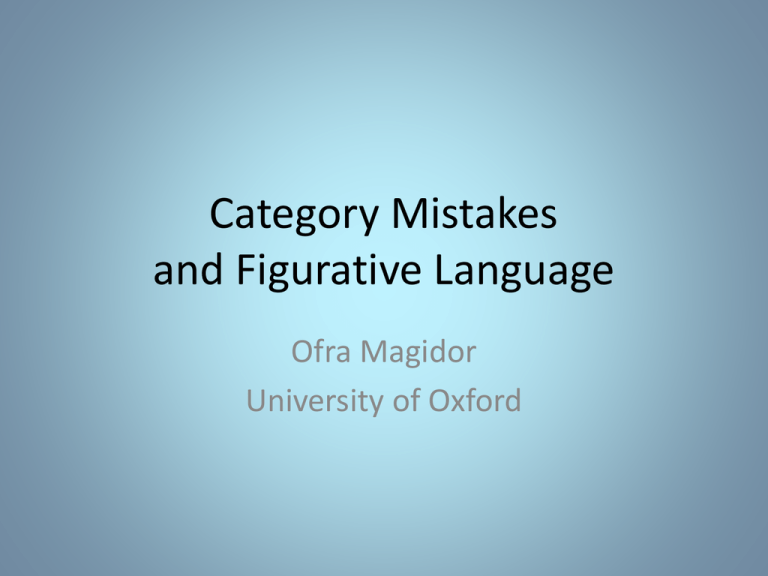
Category Mistakes and Figurative Language Ofra Magidor University of Oxford A popular view of category mistakes the philosophers: “[T]here are different ways in which a (declarative) sentence might properly becalled ‘meaningless’. Perhaps the best example involves so-called category mistakes” (Beal and van Fraassen, 2003) the linguists: “[T]here are also sentences that are syntactically well-formed, but do not make any sense…Chomsky's (1957, p. 15) famous example makes this point”(Sauerland and von Stechow, 2001) category mistakes and figurative language Metaphor: The poem is pregnant. Metonymy: The cheese sandwich left without paying. Fictional discourse: The kind moon kissed the boy goodnight. category mistakes and figurative language Main claim: The view that category mistakes are meaningless is inconsistent with many otherwise plausible theories of figurative language category mistakes and metaphor • Non-cognitivist account “[Metaphor] is something brought off by the imaginative employment of words and sentences and depends entirely on the ordinary meanings of those words and hence on the ordinary meanings of the sentences they comprise” (Davidson (1978)) category mistakes and metaphor • Non-cognitivist account • Cognitivist account I: Metaphorical meaning as conversational implicatures category mistakes and metaphor • Non-cognitivist account • Cognitivist account I: Metaphorical meanings as conversational implicatures • Cognitivist account II: Metaphorical meaning as primary meanings Metaphorical meanings as primary meanings Version 1: the literalist view (Stern): • When sentences are used metaphorically, they contain the covert operator ‘Mthat’ • “‘Mthat ’ is an operator at the level of logical form which, when prefixed to a (literal) expression φ, yields a context-sensitive expression ‘ Mthat[φ] ’ whose tokens in each context c express a set of properties presupposed in c to be m(etaphorically)associated with the expression φ” (Stern 2006) • For example: The poem is Mthat[pregenant] Metaphorical meanings as primary meanings Version 1: the literalist view (Stern): • Question: Does ‘Mthat(φ)’ require ‘φ’ to be meaningful? Answer: yes. • The problem of complex metaphors: Jane paced her thoughts around the room quickly. • Claim: in the above example ‘Mthat’ needs to operate on the entire VP • Conclusion: the entire VP is meaningful Metaphorical meanings as primary meanings Version 2: the contextualist view • Question: Does the expression being modulated need to be (literally) meaningful? Answer: yes. “such processes take us from the literal meaning of some constituent (the meaning that is linguistically encoded…) to a derived meaning” “ what I am rejecting is not the claim that the literal interpretation of the constituent is accessed before the derived interpretation – that I take to be obvious – but the claim that a similar priority holds and the level of the complete sentence”. (Recanti, 2004) Metaphorical meanings as primary meanings Version 2: the contextualist view • Question: Does the expression being modulated need to be (literally) meaningful? Answer: yes. • The problem of complex metaphors: Jane paced her thoughts around the room quickly. • Claim: in the above example, the entire VP needs to be modulated • Conclusion: the entire VP is meaningful category mistakes and metaphor • Non-cognitivist account • Cognitivist account I: Metaphorical meanings as conversational implicatures • Cognitivist account II: Metaphorical meaning as primary meanings - Literalist version - Contextualist version category mistakes and metonymy • Metonymy as conversational implicature • Metonymy and sense transfer The cheese sandwich left without paying category mistakes and metonymy • Metonymy as conversational implicature • Metonymy and sense transfer The cheese sandwich orderer left without paying category mistakes and metonomy The problem of complex metonymy: Context: - there are 30 people in the restaurant. - 10 of these ordered cheese sandwiches, in range of sizes 1-6. - Two of the costumers that ordered a cheese sandwich are impatient: Jack, who ordered a size 4 sandwich, and Jill who ordered a size 2. Conversation: A: The impatient cheese sandwich left without paying. B: Which one? A: The large impatient cheese sandwich. category mistakes and metonomy The problem of complex metonymy: Example: The large impatient cheese sandwich left without paying. Claim: the minimal unit that undergoes sense transfer is the entire NP Conclusion: The entire NP is meaningful category mistakes and metonomy • Metonymy as conversational implicature • Metonymy and sense transfer • The analogue of Stern’s view category mistakes and fictional discourse • Meaning and truth in fictional contexts: ‘A famous detective lives in 221b Baker Street’. ‘A famous philosopher lives in 221b Baker Street’. • The fictionally operator According to the fiction, a famous detective lives in 221b Baker Street. According to the fiction, a famous philosopher lives in 221b Baker Street. • Category mistakes and the fictionally operator ‘The kind moon kissed the boy good night’ ‘The evil moon spit in the boy’s face’ category mistakes and fictional discourse • The problem of fictional proper names: ‘Sherlock Holmes is a famous detective’. ‘Sherlock Holmes is a famous plumber’. • Solution: ‘Sherlock Holmes’ refers to an abstract, fictional character • Objection: no abstract object is a detective • Response: an abstract object might fictionally be a detective • Upshot: most fictions involve category mistakes! conclusion


